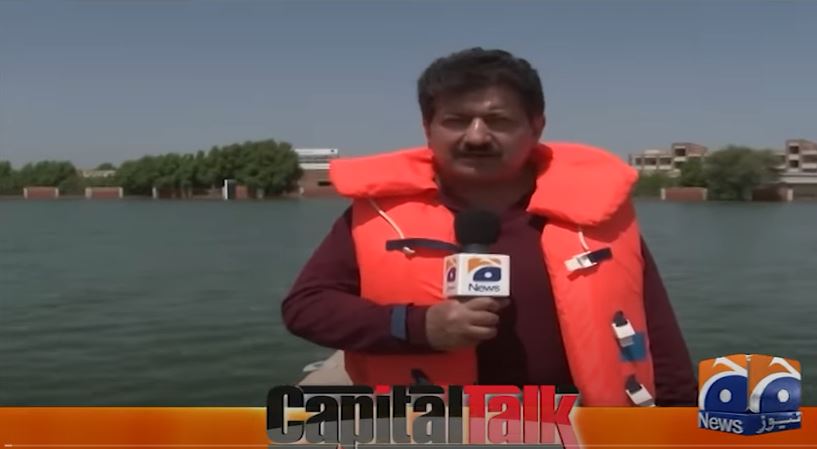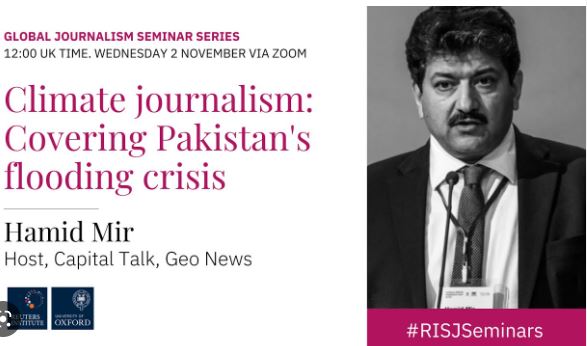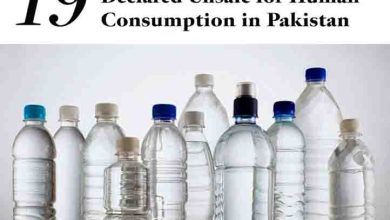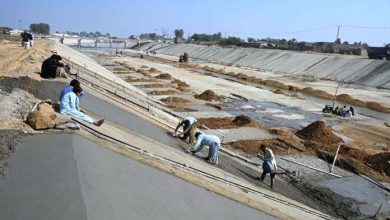Hamid Mir Highlights Challenges of Climate Change Reporting at Global Journalism Seminar by Reuters Institute
#ClimateChange disaster in Pakistan has exposed numerous legal and administrative challenges
- #ClimateChange disaster in #Pakistan has exposed numerous legal and administrative challenges
- #ClimateChange Reporting at Global #Journalism Seminar by #Reuters Institute
Islamabad: Reuters Institute for the Study of Journalism at the University of Oxford lauds the prominent journalist and host of Geo News’s Capital Talk, Hamid Mir, for his depth coverage of Pakistan’s flooding crisis.
Hamid Mir went to remote villages in Sindh province, the worst hit region of Pakistan devastated by #ClimateChange induced #FloodsinPakistan to report and highlight the challenges faced by the victims of heavy floods.

Pakistan faced damages estimated at PKR 3.2 trillion (US$14.9 billion), total loss at PKR 3.3 trillion (US$15.2 billion), and total needs at PKR 3.5 trillion (US$16.3 billion), according to the Planning Ministry’s Post-Disaster Needs Assessment (PDNA) report that says the reconstruction works will need are over $16 billion.
At the seminar “Climate Journalism: Covering Pakistan’s Flooding Crisis”, Hamid Mir, held an insightful interactive online session with 200 journalists, fellows, and officials from the Institute.

The series of online seminars features practicing journalists, journalist fellows and academic researchers from Reuters Institute for the Study of Journalism at the University of #Oxford. Reuters Institute is a UK-based research centre and think tank founded in 2006, which operates Thomson Reuters Journalism Fellowship Programme, also known as the Reuters Fellowship.
Speaking on the challenges of news reporting during the #FloodInPakstan, Hamid Mir said “the authorities and local lords blamed me as if I as “sensationalizing” this disaster issue of #ClimateChange which was actually a humanitarian crisis.
Regarding media response to #FloodsInPakstan, he said “though the loss and damage was bigger, tragedy was devastating but media did not pay attention in the earlier stages”. Media was not paying attention to #ClimateChange rather “political drama” was gaining more media attention in Pakistan, he stressed.
He further added by saying ‘When my article on floods’ devastation was published by The Washington Post, showing Climate Change as a bigger threat than terrorism, then weeks later, Pakistani media started debating on floods issue.
Later on, media organization turned to give time and space to the magnitude of devastations and human tragedy.
Speaking about the passion and patience required for reporting the humanitarian crisis, he said “I cried with tearing eyes after seeing the immense helplessness of people whose homes were under water in various districts of Sindh, and Baluchistan, of Pakistan”.
Responding to question on freedom on reporting #ClimateChange, he said “dacoits and thieves threated, feudal lords used threats to not report the disaster and sufferings of people”. “I faced pressure during the news coverage in the hometown of CM Sindh who was angry, and used criminals to pressurize me”.
He also said “this #ClimateChange disaster in Pakistan has exposed numerous legal and administrative challenges, especially, the mismanagement of government bodies and officials”.
Government is taking refuge under floods not providing relief to homeless millions in #Sindh, KP province, Southern Punjab, and Baluchistan, he added.
Speaking on the knowledge about Climate Change challenges, he said, “I learned Climate Change phenomenon from the observations of local people while reporting trip from Northern to Southern Pakistan wherein rapid deforestation and fast melting glaciers are indicators of global warming, and heatwaves devastating livelihood of people.
Responding to a question “on pressures from the establishment to toe the line”, Hamid Mid said; “Journalism is functioning under military establishment of Pakistan, a security state in south Asia. #Media is fighting for independency by sacrificing their lives or facing assassination attempts, he added.
“#Journalism is a dangerous profession in Pakistan”, he concluded.
By: M.A







